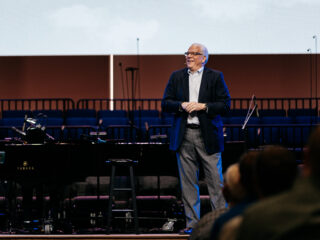Recent studies have confirmed what most of us have already figured out. People aren’t going to church the way they used to. Attendance and involvement are down across every denomination and in every demographic. No age group, no ethnic group, no area of our country has been immune from this new reality. We’ve been following this trend long enough to know it’s not a temporary slump, but a full-blown decline.
While there are some mitigating factors – more people are attending community churches with no affiliation and have a different understanding of membership – that make getting the exact numbers difficult, the primary reason is obvious.
Fewer people are going to church.
Yes, there are reasons. For one thing, streaming services have impacted church attendance. If the weather is bad (meaning it has rained, might rain, or … well, you get the picture), I’m sure to get several screenshots of people watching the services online while wearing their pajamas. Not long after, a lot of these people will discover they can stream the service regardless of the weather.
Organizations that used to respect Sunday morning no longer do. Children now have field trips and sporting events on Sunday morning most every weekend. Travel teams take up family weekends as the entire family follows the dreams of one of their children to play hockey, football, baseball, debate, or gymnastics. Stores that used to be closed on Sunday start opening at 1 pm. Now, they’re open all day.
Entertainment has discovered Sunday morning. The NFL kicks off at noon, but if you’re going to go to the game, you have to go early for the tailgate. Concerts in the park, music festivals, food festivals, book festivals, and classic car rallies now consider Sunday morning to be prime time for their events.
I guess this is to be expected. Churches should not expect any culture to support the practices of their faith. Yet, there’s more.
For one thing, everyone is in a time crunch. Families are facing multiple demands from careers, schools, and social obligations. The work/life balance has been compromised to the point that many Americans can’t tell you when their workday actually ends and their home life begins. Most people are working longer hours than before, and social media demands more and more of our attention. Because of these growing demands on our time, most of us aren’t getting enough sleep.
When the weekend gets here, if we can catch up on some sleep, we do.
All of this means when a person or family decides how they are going to spend their time, every investment of time has to be worth the time required. That is, more and more people are spending their time like they spend their money.
Every investment has to have a significant ROI – return on investment – or they won’t do it.
This brings me to a very hard question for those of us in church leadership. Is going to church worth it?
Why would anyone go to church?
Okay, I know the usual answers. The Bible says we should go. There’s exciting music and the sermon usually isn’t too bad. We get to see our friends and work together to do some good in the world.
All of that is true, but I don’t have to go to a church building for all of the above to happen. I can stream any number of worship services. I can hear sermons by some of the best preachers in the world. My family and I can find any number of non-profits that need volunteers to make a difference in the world.
So, why should any of us go to church?
To find at least part of the answer, let’s go back and find out why people went to find Jesus in the first place. Some went to find healing. Some went to have demons driven out of them which, when you think about it, is just another form of healing.
Yet, when asked, Peter said he and the rest of the disciples wouldn’t leave Jesus because they knew “Jesus alone had the words of life.” In other words, people sought Jesus because they found in Him what they couldn’t find anywhere else.
We as church leaders seem to forget this. Jesus offers the world what they can’t find anywhere else. Whenever we go to conferences on church growth, we’re told about worship services and visual effects, dramatic preaching, and comfortable pew cushions.
No one ever says, “What people need is Jesus. So, when people come to church make sure they get Jesus.” I know, no one would ever come to a conference where the message is that blunt and basic. A message like that certainly won’t drive conference ticket sales.
I know I may sound cynical, but I’m not. I’m just tired. In my ministerial career, I’ve jumped through every church growth hoop I could find. I have worn myself out. I’ve worn out my people as well.
And you know what? We’re no better off. Our marriages get divorced at the same rate as unbelievers. We become addicts at the same rate as unbelievers.
Why? Because we went to church and we were entertained and impressed, but we never met Jesus. Now, when the world comes to our churches, we don’t have anything that matters because, well, we don’t know Jesus either.
Perhaps instead of focusing on saving the world, the church should focus on finding its own salvation first. I’m convinced when we find Jesus again the community will find the church again.









